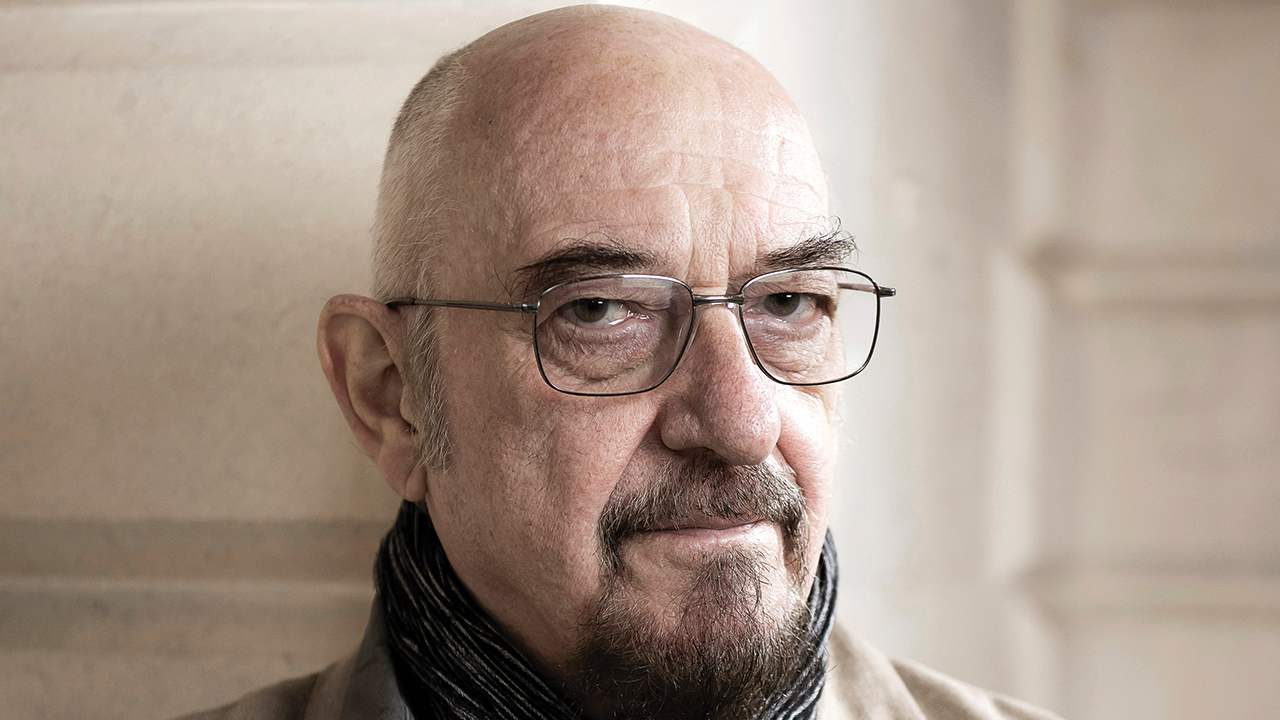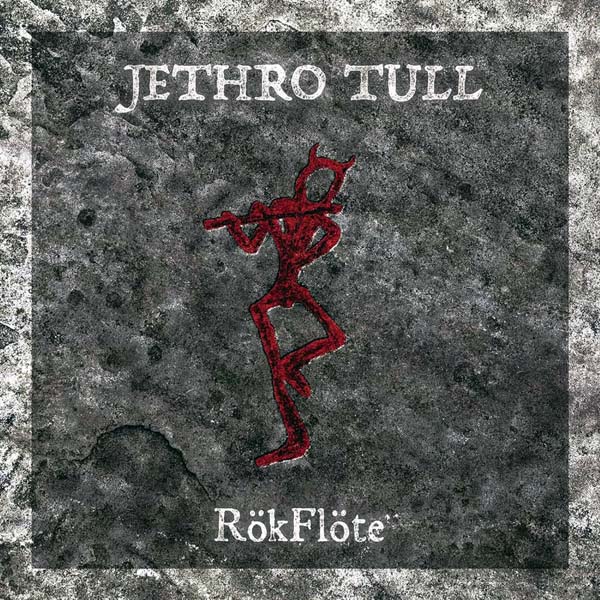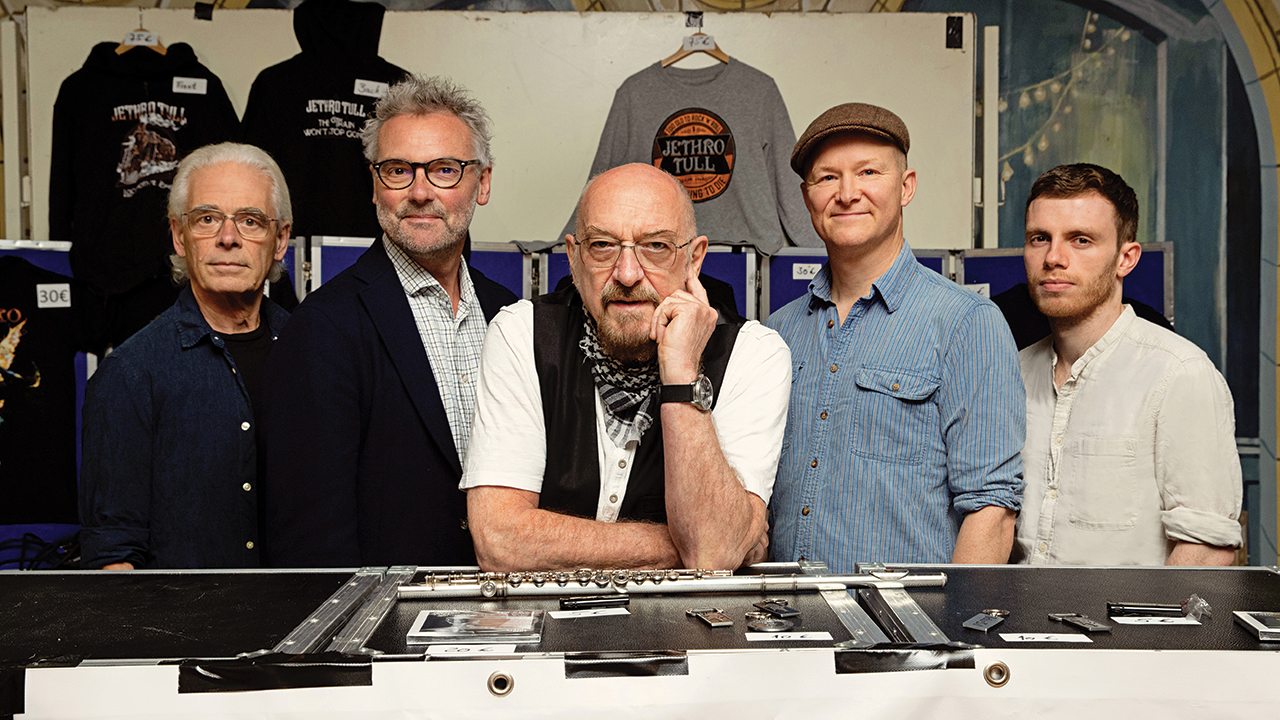
In 2023 the Ian Anderson-led Jethro Tull made their first new studio album for over 20 years. Prog caught up with Anderson to discuss Norse gods, ageing and his ambitious plan to release three studio albums in as many years.
Playfully pro-umlaut, Jethro Tull’s 23rd studio album, RökFlöte, began life as an LP of flute instrumentals, but ended up being a scholarly song collection exploring Norse mythology and paganism. This partly explains its title’s merger of the Icelandic word ‘Rök’, meaning ‘destiny’, and ‘Flöte’, which is German for the woodwind instrument Ian Anderson has played for decades.
“I suppose I liked the idea of toying with the flute of destiny,” smiles Tull’s venerable leader, chatting from his Wiltshire home via Zoom. Agreeably, he isn’t averse to sending himself up.
One doesn’t really ‘interview’ Ian Anderson; you hang on while his brain shoots off at tangents. His answers are long, winding roads, because that’s how he likes to field the questions you might occasionally manage to interject. Not that Prog isn’t delighted to listen. We’ll take verbosity over sullen guardedness any day.
RökFlöte follows-up last year’s The Zealot Gene, and constitutes one of the shortest gaps between successive Tull albums since 1980. To what, wonders Prog, do we owe this welcome burst of productivity?
“A mixture of boredom and age anxiety,” says Anderson. “As we march through the dark corridors of advancing time we all consider our own mortality. Or we should. At 75 years of age I feel a very pragmatic sense of urgency. In the arts we can extend our working lives into our 80s, if we’re careful, but that’s the best I can hope for, really. Sooner or later my annual health checks are going to flag up bad news.
“Health experts say the best measure of prevention is to continue doing what you’re doing. For me that means playing concerts, which is two hours of aerobics and beats the hell out of the gym because I get paid for it. I’ve just done three gigs in Italy. It’s a mental workout too. You’ve got to remember thousands of words – and, in the immortal words of Eric Morecambe, ‘You’ve got to remember them all in the right order.’
“I’ve met fellow performers who can’t go onstage without an Autocue,” Anderson adds. “These are guys who are 10 years younger than me! We all garble a word here and there, but seriously, you can’t remember your own songs? If you’re a Shakespearean actor, using Autocue would be a sign of abject failure. My son-in-law [The Walking Dead’s Andrew Lincoln] is a professional actor, actually – or at least that’s what he told me when he started shagging my daughter [Gael]. Anyway, he takes pride in learning the script, and singers should too.”

RökFlöte’s opening and closing tracks feature Old Icelandic-language passages narrated by guest singer and violinist Unnur Birna Vilhjálmsdóttir. The LP also packs tongue-tripping song titles, including Ginnungagap, which draws inspiration from the Norse god Ymir, a primeval being who inhabited the grassless void of the title, as primeval beings do. This is not a record for the fainthearted, but the music on it is frequently wonderful and one has to admire the painstaking research Anderson has dedicated to his subject matter. Why Norse mythology, though, and why now?
“I’d already touched upon paganism and the polytheistic faiths in my reading over the years,” he says. “But more recently I’d been rather put off by the whole Norse thing’s portrayal in contemporary movies, where it’s all a bit silly, a bit heavy metal. I decided to read The Poetic Edda to try and get to the core of what the Norse gods are about. It’s all in the album’s liner notes, where I talk about their different functions and personalities. These songs draw parallels between the Norse gods’ world and the world I grew up in, and they try to introduce a little humour.”
As Anderson expounds on his lyric writing on RökFlöte and its stringent use of trochaic octameter and iambic tetrameter, Prog gets a little lost. One thing is clear, though, namely that Tull’s leader doesn’t do things by halves. He’s not exactly phoning this stuff in.
“No,” says Anderson. “But sometimes I’d like to do exactly that: just stay at home and appear on stage elsewhere as a lifelike 3D mirage because I’m not a happy flyer,” he adds, raising his eyebrows for emphasis. “Then again, somebody has to do what I do. You’re not going get this kind of searching philosophical analysis from Ed Sheeran, are you? Somebody has to be the kind of songwriter who doesn’t give a shit if he gets called pretentious.”
Prog glances down at questions through which scant progress has been made, but another corridor of thought opens up and Anderson marches down it. He recalls his "old mate Roy Harper” inviting him down “the thorny track of exploration”, and the huge personal landmark that occurred when he first heard Pink Floyd’s The Piper At The Gates Of Dawn. “It weaned me off being a blues impersonator and showed me a signpost which said ‘This Way,’” he says. “It showed us that pop music could be progressive and challenging, that it had a future.”
It did indeed. These Norse gods, though… Clearly Anderson feels we can still learn from them?
“We can. And one of the key lessons is: look, but don’t touch. Unfortunately some of those who fantasise about Nordic paganism tie it to right-wing extremism. It’s all very predictable in a way, because [German classical composer] Richard Wagner went down that road and [prominent member of the Nazi Party] Heinrich Himmler saw himself as some kind of Nordic hero and identified with the mythology. It’s dangerous stuff, you know? But the intrepid songwriter can still pick a careful path through the land mines, and that’s what I’ve tried to do.”
Anderson’s work ethic is such that he began writing RökFlöte on January 1, 2022. No day off post-Hogmanay for him. The album finds guitarist Joe Parrish-James supplant long-term Anderson foil Florian Opahle, who left Tull to concentrate on RedBoxx Studios, the recording and photographic enterprise he runs with his wife. “We were sorry to see Florian go and I suspect he rather regrets his decision,” says Anderson. “But I had to find a replacement quickly and Joe is great.”
Each band member was given a couple of months to digest RökFlöte’s music and lyrics, then Tull went into the studio a handful of times last June and July, nailing two or three songs each time. “Then I took the masters home to do the final flute parts, vocals and mixing,” says Anderson. “So long as you’ve got a reasonably fast microprocessor and enough gigabytes to store the multi-tracks safely, it’s perfectly feasible to work that way.”

Another point that RökFlöte makes is that, like many belief systems, Norse paganism embraces the notion of a time of reckoning: a final days showdown. Does Anderson believe we’re nearing the Apocalypse now?
“I’m essentially an optimist,” he says, “but that fear of the final shootout at the OK Corral is genetically programmed into us. In religions and in mythology, it tends to have a positive outcome; some kind of renewal in a more peaceful and resolved society. But I can’t say I feel like we’re going in that direction today.
“Then again, those embedded in the First and Second World Wars probably thought that was Armageddon, and those of us who grew up during the Cold War years thought the end was just around the corner. Now, sadly, we’re experiencing increased tensions with the old-school, dictatorial communism of North Korea; the pragmatic, pseudo-communism of China; and the entirely corrupt and despicable regime of Vladimir Putin, and that’s what we should fear. Putin is a paranoid man struggling with physical and mental decline. He’s no longer behaving rationally, and that’s frightening.”
As our interview winds down, Prog steers the conversation towards lighter topics. Yes, Anderson has met his fellow flautist Thijs van Leer of fellow prog grandees Focus, but only really in recent years.
“Focus are still out and about at summer festivals in Europe and our paths cross,” says Tull’s leader. “Thijs van Leer is a very good flute player, but the millstone around is neck is that one piece [Hocus Pocus] where his yodelling is perhaps more important than his flute playing. I remember hearing it on American radio when we were touring and thinking, ‘Who the hell is this? I must check this band out.’”
Anderson’s own flute playing, meanwhile, is still very much sought after. This isn’t just because of its brilliance, but also because of his policy of playing on other people’s records without payment.
“I think you should be able to offer your skills gratis and do it in the right spirit,” he says. “But I sometimes have to turn stuff down. I can commit a couple of hours to learning something, but at this stage in the game I can’t commit two days to learning some 10-minute prog rock epic. I remember Steve Hackett asked me to play on something and I had to say, ‘Sorry Steve, I’m just not up to it!’ But it’s easy for him. Steve grew up doing that stuff while Peter Gabriel was dressed as a giant sunflower.”
Asked whether Jethro Tull’s next studio album will arrive as quickly as RökFlöte, Anderson is hopeful. Just as he started work on RökFlöte on New Year’s Day 2022, so he started work on its as-yet-untitled follow-up on January 1, 2023. “It’s a case of get the Kleenex out while you feel the creative juices flowing,” he says, rather unsavourily.
“I’ve got a page of detailed scenario and song titles,” Anderson adds. “Plus a provisional release date of October 2024, which would make it three studio albums in three calendar years. It would be foolhardy to try and explain anything of what the next album will be about at this stage, though. I know from bitter experience that its content may change dramatically before we get to the artwork and final packaging.”
With that, it’s time for Anderson to go, but not before he reveals that his next flight will him take to Glasgow, where he has scheduled two days off to visit exhibitions at Kelvingrove Art Gallery and perhaps sample the odd curry.
Does this well-known connoisseur of Indian cuisine have a favourite restaurant in Glasgow?
“Not really,” he says. “But last time we had a curry in Glasgow it played havoc with our drummer Scott’s bowels; he almost missed the gig. He made the mistake of telling them he liked things really hot, and they laced our food with spice dynamite. The chefs were giggling when they looked around the kitchen door.”







